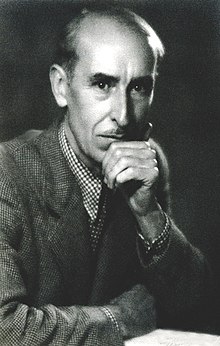Henri Fauconnier
Henri Fauconnier (born February 26, 1879 in Musset, Barbezieux , † April 14, 1973 in Paris ) was a French writer. In 1930 he received the Prix Goncourt for his novel Malaisie .
Fauconnier belonged to a group of writers in Barbezieux, which also included his sister Geneviève Fauconnier (1886–1969), who received the Prix Femina in 1933 for her novel Claude . Other members were the friend of Fauconnier Jacques Chardonne (1884–1968), born Jacques Boutelleau and from the de Haviland porcelain dynasty (he received the Grand Prix du Roman of the Académie francaise for Claire in 1932 ), and members of the Delamain family (known as a cognac manufacturer). Fauconnier wrote plays at an early age, which he staged with friends in his hometown. In 1902, after his father's death, he went to England for two years, where he taught music. In 1905 he went to Malaysia to open a plantation and from small beginnings (also with financial support from friends) became very successful (rubber, palm oil). He served voluntarily in World War I and then took care of his plantations again. In 1925 he moved to Tunis (he wanted to be close to France, but he didn't like the climate or the city of Paris). A book about Malaysia (Malaisie) won the Prix Goncourt in 1930. He maintained a lively correspondence with important writers. In the 1930s he moved back to his homeland because he feared an Italian invasion of Tunisia. In 1957 he made another trip to Malaysia. He is buried in Barbezieux.
Works (selection)
- Malaisie, Stock 1930
- German translation: Palmenhaus, Leipzig 1939
- Visions, 1938
- Lettres à Madeleine: 1914–1919, Stock, 1998
literature
- Roland Fauconnier, Henri Fauconnier, conquêtes et renoncements, Paris, Éditions du Pacifique, 2014
Web links
| personal data | |
|---|---|
| SURNAME | Fauconnier, Henri |
| BRIEF DESCRIPTION | French author |
| DATE OF BIRTH | February 26, 1879 |
| PLACE OF BIRTH | Barbezieux-Saint-Hilaire |
| DATE OF DEATH | April 14, 1973 |
| Place of death | Paris |
